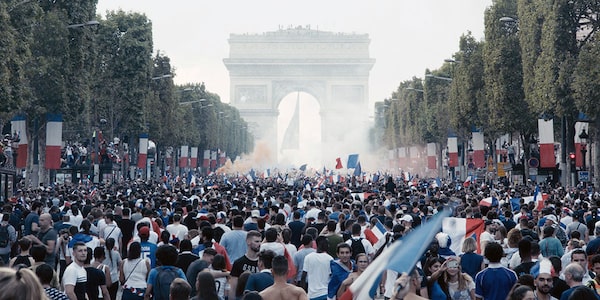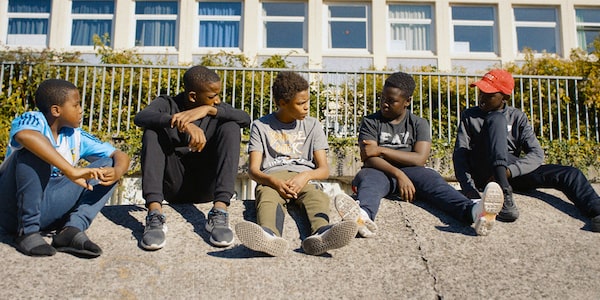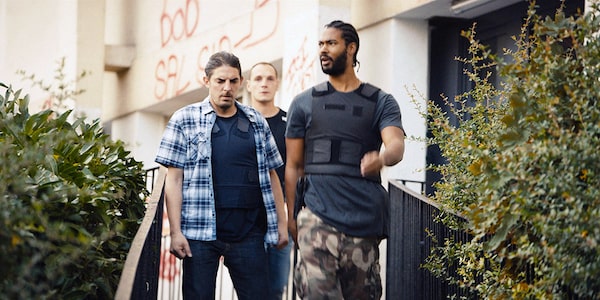
Ladj Ly's Les Misérables opens on a high note – the July, 2018, day when France wins the World Cup.Courtesy of TIFF
- Les Misérables
- Directed by Ladj Ly
- Written by Ladj Ly and Giordano Gederlini
- Starring Damien Bonnard, Alexis Manenti, Djibril Zonga and Issa Perica
- 103 minutes
Les Misérables, the French drama that just earned an Oscar nomination for Best International Feature, is one of those scratchy, hottest-day-of-summer, something-is-gonna-blow films. It may remind you of Boyz n the Hood, Training Day, Do the Right Thing or especially La Haine, and that seems just fine with director/co-writer Ladj Ly. He gives us a barricades-eye view of a culture clash that first simmers, then explodes, then excoriates.
Ly opens on a high note: the July, 2018, day when France wins the World Cup. People of every class and colour wrap themselves in the French flag and sing in the streets around the Arc de Triomphe, and we get Ly’s point: This is what France looks like now. The next day, Ly takes us into Les Bosquets housing projects in Montfermeil, the low-income banlieue east of Paris where Victor Hugo set his 1862 novel, and we see how fleeting – and false – that moment of unity is.

Les Misérables shifts among several groups that call the Les Bousquets housing projects home, including the local youth led by Issa (Issa Perica, centre) and three policemen on the anti-crime brigade.Courtesy of Amazon Studios/Courtesy of TIFF
Born in Mali, Ly was raised in Montfermeil, and began his career as a documentarian. Working in a deliberately verite pace and style, he uses a full hour to sketch out the social strata of his mean streets: There are the small-stakes criminals, led by the Mayor (Steve Tientcheu), who controls the market stalls. There’s the Muslim Brotherhood, who are trying to keep a lid on violence, led by Salah (Almamy Kanouté), a reformed jihadi who runs the shawarma shop at the heart of the action. There are the restless teenagers who are pawns in their games, represented by Issa (Issa Perica), a smiling child trying on a swagger.
And rolling through Montfermeil, keeping an eye on the tensions – and often aggravating them – are the Anti-Crime Squad, three cops who could be named Id, Ego and Superego. Id is Chris (Alexis Manenti), the de facto boss. The children call him Pink Piggy and he embraces the title. A bully on the take who likes frisking teenage girls, he calls himself a realist, not a racist. He knows all the kids’ names, doesn’t he?
Ego is Gwada (Djibril Zonga), a local who keeps his head down and does what he can to protect his people. Superego is Stéphane (Damien Bonnard), newly transferred from Normandy. Today is his first day in Paris, and we see the cacophony through his eyes. The minute we hear his (female) boss say, “I appeal to your solidarity. … No team, we are alone” – we know things will go horribly awry.

The newest to these streets is the cop Stéphane (Damien Bonnard, left). While his plainclothes partners Chris (Alexis Manenti, centre) and Gwada (Djebril Zonga, right) are more into playing at being cowboys, he approaches his job with an earnestness they have long lost.Courtesy of Amazon Studios/Courtesy of TIFF
The crisis is set off, as they often are, by a series of bizarre events. Issa steals a lion cub from a circus owned by well-armed travellers. The street children object to his arrest and start a miniriot. Tear gas flies, followed by a Flash-Ball gunshot that hits Issa squarely in the face. Local nerd Buzz (Al-Hassan Ly) catches the mayhem on his drone camera, and now Chris will do anything to prevent a PR catastrophe. (Please note that the Flash-Ball gun does not kill Issa. If this were an American film, the result would be sadly different.)
Ly witnessed first-hand the infamous Paris riots of 2005; ten years ago he happened to film a police blunder, and released the footage to the press. (The cop was suspended.) He combined those two events in his 2017 short film Les Misérables, which won a Cesar. Then he expanded that short into this feature. He claims to have shot 100 hours of footage, and his film is best when it immerses us in small moments and naturalistic performances, propelled by Pink Noise’s electronic score.
In the final act, cops and street children fight a desperate battle in an abandoned apartment block. It’s a metaphor, but it’s earned. And although the ending is more ambiguous that any U.S. producer would allow, we see how Issa’s smile has scarified into a hardened scowl. Any hope of solidarity he had has gone up in flames.
Les Misérables opens Jan. 17 at Toronto’s TIFF Lightbox and next week in Vancouver.
Live your best. We have a daily Life & Arts newsletter, providing you with our latest stories on health, travel, food and culture. Sign up today.
 Johanna Schneller
Johanna Schneller